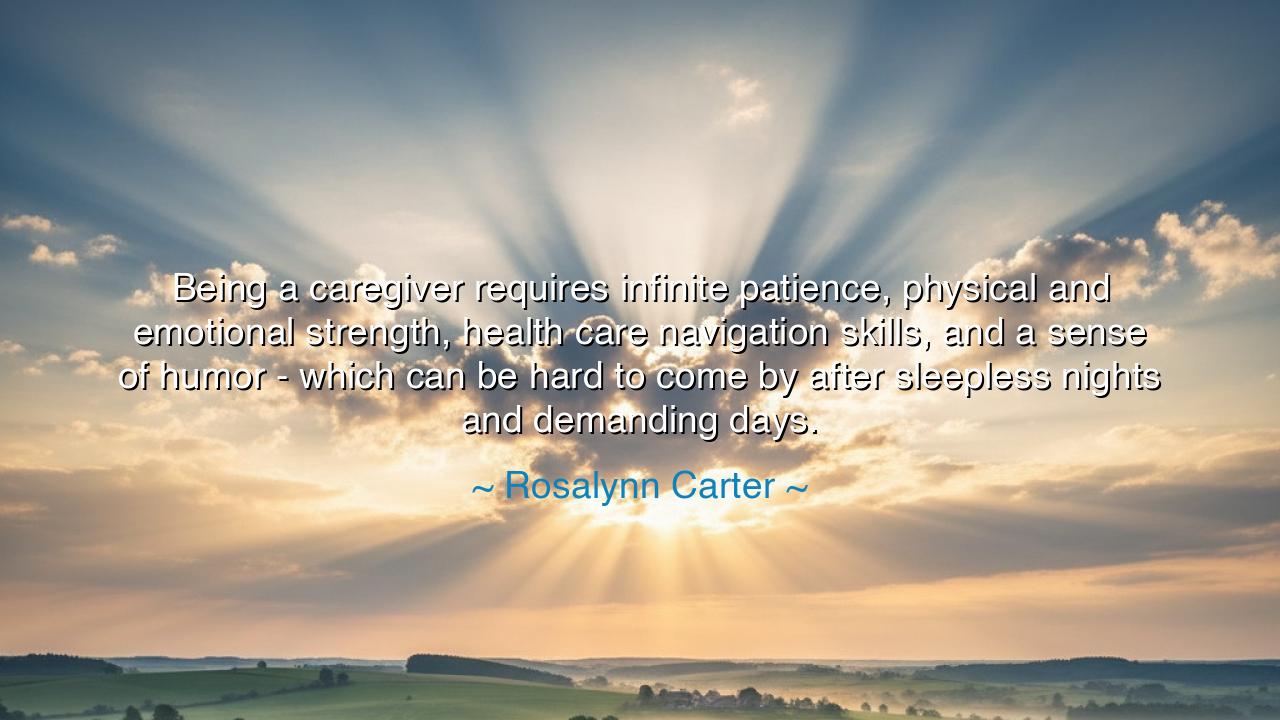
Being a caregiver requires infinite patience, physical and
Being a caregiver requires infinite patience, physical and emotional strength, health care navigation skills, and a sense of humor - which can be hard to come by after sleepless nights and demanding days.






The wise and compassionate Rosalynn Carter, a woman who spent her life in service to others, once said: “Being a caregiver requires infinite patience, physical and emotional strength, health care navigation skills, and a sense of humor — which can be hard to come by after sleepless nights and demanding days.” In this simple yet profound truth lies the essence of what it means to give of oneself completely, to bear the burdens of another with love rather than obligation. Her words rise not from theory, but from the lived experience of tending to those in need, of walking beside the weary and the wounded. She speaks to an ancient calling — the sacred art of caregiving, a task that demands both the endurance of the body and the gentleness of the soul.
In every age, the caregiver has stood as a quiet pillar of civilization. In the temples of Asclepius, the healers of Greece tended to the sick not only with herbs and salves but with listening hearts. In the monasteries of the Middle Ages, monks carried the fevered and the dying from battlefields to beds of mercy. And within every home since time began, mothers, fathers, children, and friends have kept this sacred duty alive — to tend the fragile, to comfort the suffering, to preserve life where it flickers low. Carter’s words are a hymn to these nameless saints who do not seek glory, but give it daily in acts of patience and compassion that often go unseen.
When she speaks of infinite patience, she acknowledges that caregiving is not a fleeting duty but a continual labor of love. To rise at dawn after a sleepless night, to soothe the restless, to bear the frustration of decline or illness — this is a test of spirit as much as flesh. The strength she speaks of is not only the strength of muscle, but of heart, for the caregiver must carry another’s suffering without being crushed beneath its weight. They must learn to navigate not only the labyrinth of health care systems, but also the maze of emotion — fear, exhaustion, grief, and guilt. Yet through it all, she reminds us of the one gift that can transform even the hardest day: a sense of humor, that divine spark of joy that lifts the weary spirit when all else seems lost.
Consider the example of Florence Nightingale, who walked through the blood-soaked tents of Crimea when death itself seemed her only companion. Surrounded by agony, she chose not despair but devotion. She wrote letters home for soldiers who would never see home again, and lit her lamp each night to walk the corridors of suffering. Her strength was not born of ease, but of purpose — the same strength that Carter honors in her words. Like Nightingale, every caregiver is a quiet warrior, fighting not with weapons but with tenderness, enduring not for glory but for love.
The origin of Rosalynn Carter’s reflection lies in her lifelong advocacy for mental health and caregiving. As First Lady of the United States, and long after her years in the White House, she worked tirelessly to bring dignity to the invisible labor of those who care for others. She understood that to care for the ill, the aged, or the broken is not merely a task of service — it is a moral calling, one that tests the boundaries of compassion itself. She also knew the loneliness that so often accompanies the role. To give endlessly without recognition, to sacrifice sleep, comfort, and even one’s own health — such trials demand a strength that few acknowledge, yet upon which countless lives depend.
In her words, there is also a quiet recognition of human frailty. Even the most devoted caregiver can grow weary; even the most loving heart can falter. That is why she speaks of the need for humor, for laughter amid tears, for light amid shadow. The ancients, too, understood this balance. The Stoic philosophers taught that endurance without joy is bitterness, but endurance with joy is greatness. The caregiver’s laughter, born of fatigue and love intertwined, is a small rebellion against despair — a reminder that even in service, one’s own humanity must not be lost.
From Carter’s wisdom flows a lesson for all generations: that compassion is both a gift and a discipline. To care for another is not a weakness but a sacred strength. Yet those who give must also receive — rest, support, understanding. Let every society, every family, and every individual honor their caregivers not with empty praise but with real help: time off, community resources, listening ears. For if we fail to care for those who care for others, the very foundation of love upon which our humanity rests begins to crumble.
So let her words echo through the ages: “Being a caregiver requires infinite patience…” Yes — but it also requires infinite gratitude from the rest of us. Let us be the hands that lift the weary, the voices that speak thanks to the unseen healers among us. Let us build a world where compassion is shared, where no one carries the burden of care alone. For in doing so, we honor not only the living but the eternal truth that runs through every age — that to care for another is to touch the divine.






AAdministratorAdministrator
Welcome, honored guests. Please leave a comment, we will respond soon